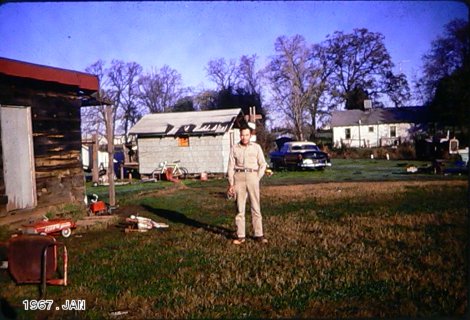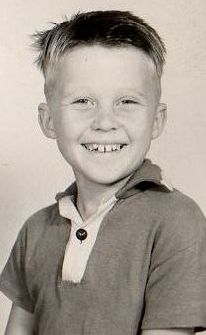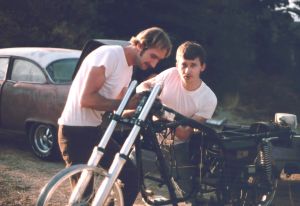| BIOGRAPHY AND HISTORY |
|
|

1967.01 January Small building was, at one time, "home" untill I was five years old. The left foreground shows a corner of the bigger house. The guy is my Dad. In the back, you see an old '53' flathead ford with the hood - characteristically - in the up position. |
|
KEDDIE (picture:1999) All the houses have been torn down... |
 Me - 1954 in the third grade, which I failed.
Me - 1954 in the third grade, which I failed.
|
|
1966.DEC Grandma's house ARK |
|
1968.FEB Vandenberg AFB I was involved in a classified program, involving remote control. |
|
"Bear in mind that you should conduct yourself in life as at a feast."
Epictetus |
|
WHERE art thou, my beloved Son, Where art thou, worse to me than dead? Oh find me, prosperous or undone! Or, if the grave be now thy bed, Why am I ignorant of the same That I may rest; and neither blame Nor sorrow may attend thy name? William Wordsworth |
|
" Let us live so that when we come to die even the undertaker will be sorry."
Mark Twain |
|
1973 BACK YARD |
|
1970 CB750 Honda |

1980 Two brothers |
|
1974.APR Building a shed |
|
"I always keep a supply of stimulant handy in case I see a snake - which I also keep handy."
W. C. Fields 1946 |
|
1974.APR Closet entertainment center |
|
Even a faster ride... 1998.07 JUL GPZ-1100 |
|
I purchased this house. |
|
I insulated, and sheetrocked the garage; and I put down carpet befitting my GPZ 1100 super bike. This was no longer an ordinary garage: this was a big "fun" room. (Why am I so immature?) |
|
Mom and Dad passed away early. Dad at 66 from two decades of problems, a heat attack and several strokes. Mom from emphysema at 71. Moms emphysema was caused by poisonous second hand cigarette smoke. POISON Poison |
|
2000.MAY I planted azaleas. They, and all flowers, have a certain enate glory that can not be owned. And worse: are ephemeral. They shine brightly only to fade away. I don't know about my neighbors azaleas, but the azaleas that you see in the picture are only on loan. |
|
I now can see with better eyes;
And worldly grandeur I despise,
And fortune with her gifts and lies.
William Wordsworth |
|
"Posterity is just around the corner."
George Kaufman |
|
2008.JAN Computer Room |
|
"We should take care not to make the intellect our god, it has, of course, powerful muscles, but no personality." Albert Einstein |
|
1982 "Workshop" |
|
17?? Coat Of Arms In the house of Joseph Pennock: Born 1677 |